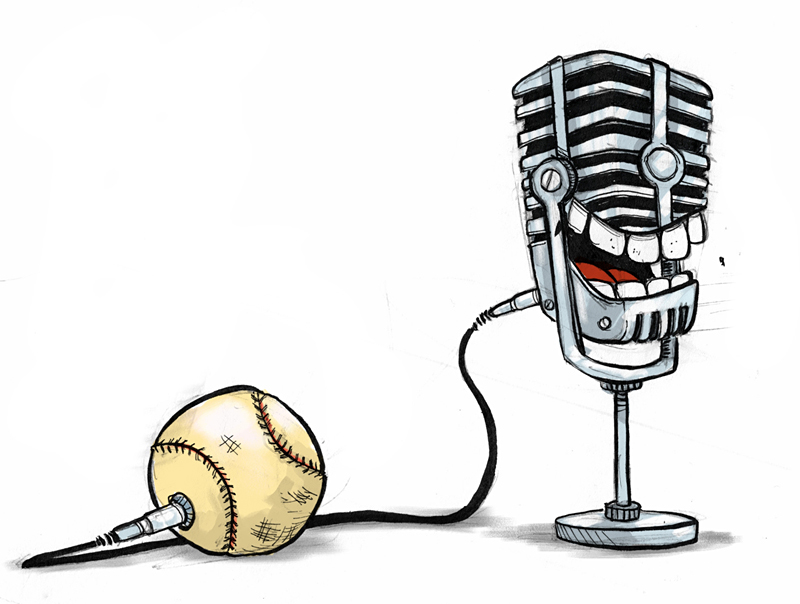Midway through coffee, Ken Levine, a new member of the Mariners broadcast team, stops mid-sentence and leans in across the table. He lowers his voice. “This is a crazy question, and I may be totally wrong,” he says, “But is the girl behind you the girl from Glee?”
The question is not crazy. Along with being an announcer, Levine is also an Emmy-winning television writer. He is sitting in an L.A. coffee shop not far from Fox Studios. The mid-morning crowd includes some Spanish-speaking executive types, a pair of well-dressed young mothers sitting out in the sunshine, and the usual mix of hurried businesspeople, bored housewives, and out-of-work Hollywood wannabes. It also apparently includes a Glee cast member.
In 30 minutes she will walk out, and Levine will say “I think it is. Lea Michele.”
Levine had just been talking about the evenings he spent in the 1980s on the top deck of Dodger Stadium. He would show up with a gym bag full of equipment and grab two seats—the top deck was open admission—in the first row directly behind home plate. He would drape a microphone over the railing and set up audio equipment beside him. Then, among the families, drunks, and empty seats, Levine would call ballgames. Eventually, he says, he built a following—the same fans began to gather in the nearby seats every evening.
The recordings he produced would lead Levine to his first play-by-play job in the minors and eventually to Seattle, where he worked for three seasons in the early 1990s as a color commentator. Now Levine returns as part of the revolving crew of announcers the Mariners have tapped to replace Dave Niehaus—a Hall of Famer and the voice of the franchise from its 1977 inception, who died in November of a heart attack. He was 75.
Levine is 60 and the only member of the Mariners broadcast team to have connected Tom Hanks to his future wife Rita Wilson. (He co-wrote the ’80s Peace Corps comedy Volunteers, in which Hanks and Wilson starred alongside John Candy, who played Tom Tuttle from Tacoma). He is also the only member of the team who will commute to games from Los Angeles.
During Levine’s first stint in Seattle, he served as a color man to Niehaus and sometimes filled in with play-by-play. He recalls one game during which he received a mysterious phone call to the press box from a “Tom.” He returned the call to find that it was Hanks, in town filming Sleepless in Seattle, who a few nights later would come to the Kingdome to throw out the first pitch and serve as a guest commentator.
Levine is more established in Hollywood than in baseball. But that’s to be expected. He was in his mid-30s when he took up broadcasting, and mid-20s when he penned his first episode of M*A*S*H with partner David Isaacs. Even in the booth, a comedy writer lurks. “You learn from speaking patterns,” Levine says. “It’s how I learned how to do play-by-play, and also how to write comedy: watching people I really admire and trying to deconstruct what went into their thought process. What led him to connect this to that?”
So you can watch a Dave Niehaus broadcast and a Woody Allen movie the same way? “Kind of. The big difference doing play-by-play is that you can’t fix the ending.”
Like any comedy writer worth his weight in one-liners, Levine also knows not to overstay his welcome—or overstep his expertise. “I don’t want to be standing there with [former Mariners third baseman and color commentator] Mike Blowers and saying ‘Oh, a third baseman should make that play.’ It’s like, excuse me, who played?”
Levine, who’s also been a director and a show runner, has a comedy-writing resume that includes episodes of The Simpsons, Wings, Becker, Cheers—for which he won his Emmy—and Frasier. On Frasier, you can sometimes hear him as the broadcaster of whatever game Martin Crane happens to be watching. And his Simpsons scripts include “Dancin’ Homer,” one of the show’s earliest and funniest baseball-themed episodes.
In Levine’s mind, the funniest baseball announcers include San Francisco’s Jon Miller, Cincinnati’s Marty Brennaman, Milwaukee’s Bob Uecker, and the late Niehaus himself. But he also respects the more straightforward types.
“If you’re not a funny person, I appreciate you not trying,” he says. “There’s nothing worse than an unfunny person trying to be funny.”




